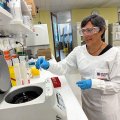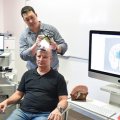Australia’s first ever survey of the mental health and wellbeing of families with children with a disability was released today (October 10), World Mental Health Day.
Professionals who work with these families will also be surveyed as part of a five-year, $5 million project funded by the National Health and Medical Research Council.
The Stepping Stones Triple P (SSTP) Project will evaluate the effectiveness of Triple P’s Stepping Stones program in reducing behavioural and emotional problems in children with a disability across a population. The project brings together researchers from The University of Queensland (UQ), The University of Sydney and Monash University. It will start in Queensland first, followed by Victoria and New South Wales.
As part of the project, from early next year almost 20,000 Queensland families who have a child with a disability between the age of two and twelve will have free access to Triple P’s evidence-based parenting program Stepping Stones.
Stepping Stones is a multi-level program designed to meet the needs of parents and caregivers of children with a disability. It provides practical parenting strategies to help them better manage their children’s emotions and behaviour, and reduces stress levels by increasing parenting confidence, competence and resilience.
Founder of the acclaimed parenting program Triple P and head of the project team for UQ, Professor Matt Sanders said today data from the two surveys will help establish how to make Stepping Stones widely accessible to families impacted by a child’s disability.
Hundreds of professionals such as psychologists, counsellors, teachers, speech therapists, child health nurses and family support workers will be offered free Stepping Stones training to make it convenient for families to attend the free parenting sessions.
Professor Sanders said young people with disabilities such as Autism Spectrum Disorders, Cerebral Palsy and Down Syndrome experience three to four times the rate of emotional and behavioural problems compared to typically developing children.
“Parenting is already a challenging job, but parenting a child with a disability can take family stress to a whole new level. This project gives us the chance to support families across three states and will make an enormous difference to people’s day-to-day lives,” he said.
Parents, caregivers and professionals can access the surveys at www.mysay.org.au
Media: Rachel Stewart, Communications Coordinator, Triple P (0408 130 767)
.jpg)











